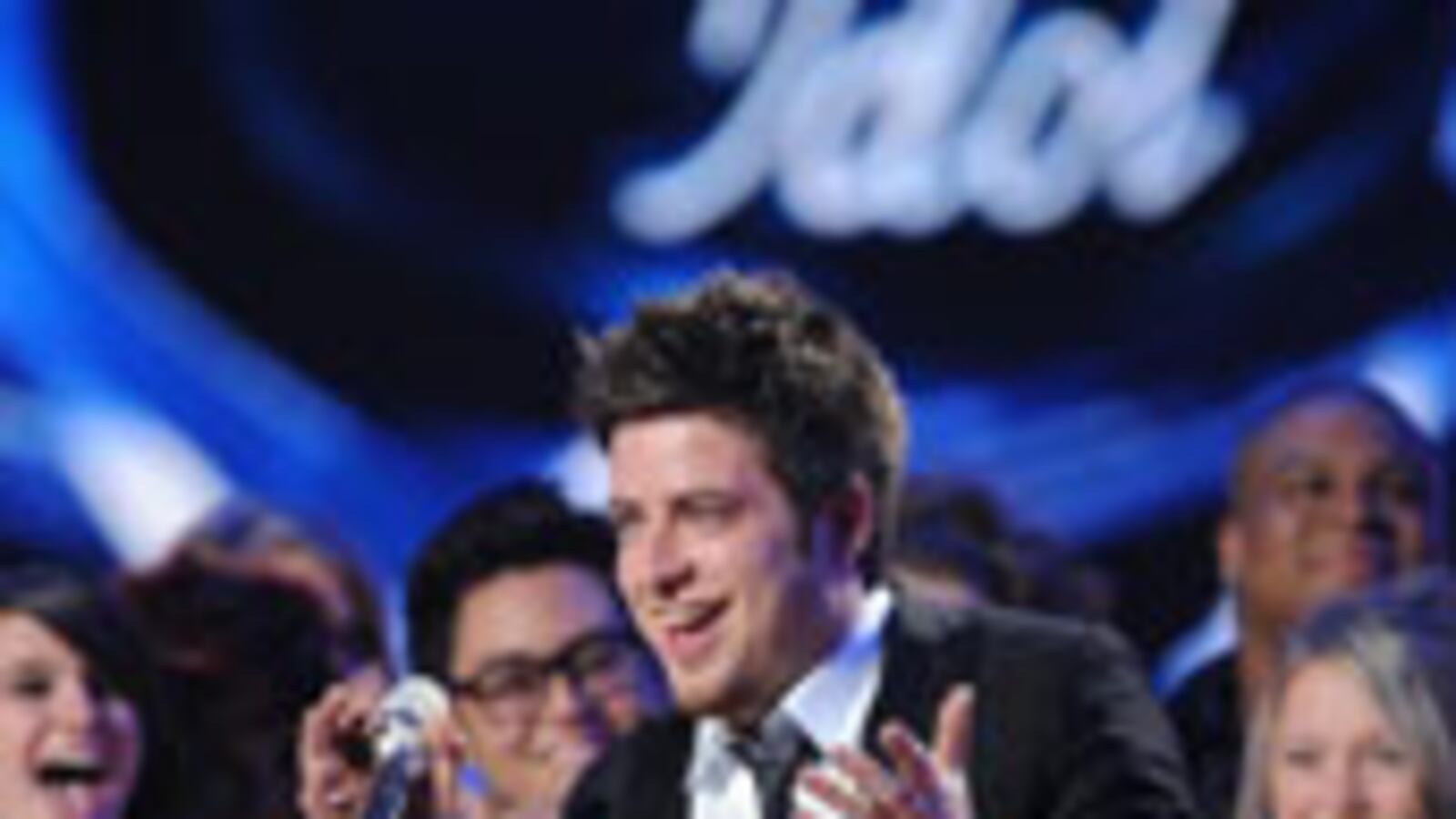
Ryan Seacrest said it; we didn’t.
In his introduction to General Larry Platt on the American Idol season finale Wednesday night, Seacrest harked back thusly: “So many great memories on this show, like Fantasia singing ‘Summertime,’ Kelly Clarkson’s performance of ‘A Moment Like This,’ and Adam Lambert’s version of ‘Mad World.’ But this year history was made with four simple words. Pants. On. The. Ground.”
That about sums it up. On Simon Cowell’s final season, it seemed often as though the show’s A plotline, the search for the next superstar, had just about run out of steam. From a lackluster top 12 to the most low key of contestants, Lee DeWyze, taking home the prize, even after effectively being walked all over in the finale by his more colorful opponent, Crystal Bowersox.
One wonders if Kelly Clarkson and Carrie Underwood, the two greatest stars the show has created, would win if they tried out today.
Of course, Idol has seen lackluster seasons before and has come back from even stronger. (For devotees of numerology the weakest seasons seem to come every third year–3, 6, 9). But with this year’s result the problem seems a bit more systemic. In particular, if three times makes a pattern, Idol then has set in to what seems a hardened law that the winners will be exclusively low-key, cute, white, male rockers, as seen in the last winners David Cook, Kris Allen and now, Lee DeWyze.
• Full coverage of Idol This change, on one level, may be well and good. American Idol was not invented to satisfy urbane online critics but to be the ultimate expression of musical democracy. As much as highbrow America may enjoy weighing in and even fooling themselves, as they seem to every year, that their quirky darling can actually successfully storm the barricades, those hopes have always been misplaced. The broadest, most populist, all-embracing tentpole of international entertainment truly was invented as much as anything as a way around elite critics, and if what the electorate wants is understated cute white male rockers, it makes good sense to give it to them, particularly in these days when anyone has a difficult time claiming the continuing loyalty of any audience.
But on another level, the question is: What becomes of the show when it predictably pulls its champions from one very narrow groove? In the first years, with Kelly, Ruben, Fantasia, Carrie, Taylor, and Jordin, the champions were all over the demographic and stylistic map.
And more to the point, when one looks back on the Idol stars of yore, lined up on stage as they were tonight, one wonders if Kelly Clarkson and Carrie Underwood, the two greatest stars the show has created, would win if they tried out today.
The answer to that question is of course unknowable, but that fact alone, that it is an open question, shows how far the show has come from its formative era.
Looking back, two changes seem to mark the sea change in Idoldom.
The first, whose importance only now seems clear, was the introduction of musical instruments at the beginning of Season 7. Before this point, Idol contenders were typically traditional chanteuses, noted for their prowess at feats of vocal acrobatics. Not only Clarkson and Underwood, but winners and Idol greats Ruben Studdard, Clay Aiken, Fantasia Barrino, Jennifer Hudson and Jordin Sparks all, in various ways, arose out of this tradition.
Since the rules were changed to allow instruments, the contest has been dominated by musicians, much more out of the rocker or singer/songwriter tradition, then pure songbirds. David Cook, Kris Allen, and Lee DeWyze are most at home behind a guitar (or also a piano in Allen’s case) and it is difficult to imagine them performing without them. Both Cook and Allen beat out contestants who were much more pure singers (David Archuleta and Adam Lambert), noted for their breathtaking vocal range. This year, both of the finalists, indeed the entire top 3 were musicians.
The other change, more widely discussed, is a shift in society that seems to have overtaken Idol’s democracy. In Season 2, when voting by text message was introduced, the concept was so new that Ryan Seacrest had to demonstrate on the air how text messaging worked. Seven years later, text messaging is not just ubiquitous, but it has become the preferred mode of communication among America’s very young.
Speculation on this matter has to be couched in a host of qualifiers, as there is no demographic information available on the Idol electorate. However, the rise of Idol’s cute boy dynasty coincides roughly with the time—about three years ago—when cell phones and text messaging came widely into the possession of the young, and hyper-motivated as only the young can be, learning to text from that very early age, they developed thumb powers beyond the capacity of those who picked these things up in their dotage.
American Idol is home to the broadest audience watching any piece of entertainment existing today. Even with its ratings down, Idol is the last show that entire families view together; young, old, rich, poor, across the racial and socioeconomic lines—everyone watches American Idol and everyone is empowered to vote. As Simon Cowell rightly pointed out in his farewell address, you are the judges.
However, what happens when one of our judges knows how to use his or her cell phone a whole lot better than any other judge? When adults talk of casting votes for their favorite, they will tell (again with no statistics available this evidence is necessarily anecdotal) of dialing 5, 10, 15 times perhaps, and then feeling their work is done. After 10 minutes or so, all but the dementedly committed grown-ups will feel they have done their duty to democracy.
Ask any parent of an 11-year-old Idol fan how many times their child voted. On finale night the phone lines were open for four hours and you won’t have to look hard to find a parent whose child dialed pathologically non-stop through that entire window, casting perhaps hundreds of votes.
If these young voters have now swamped the electorate, that is not all bad, for Idol, and for democracy. On one level, with its one man/unlimited votes structure, Idol is a test not just of pure numbers but of enthusiasm; what factor is after all a better gauge of likely support for a future recording artist. And further, advertising being what it is, you don’t hear many shows complain that their audience is skewing too young. If that’s the effect, then that, for a TV network, is a very good problem to have.
On the other hand though, having one group so thoroughly dominate what is, as mentioned, the broadest audience known to humanity can not be good for the show in the long run. If we truly must hang a “Carries, Kellies and Fantasias Need Not Apply” sign on Idol’s front door, that is a big slice of its appeal getting locked out. This year’s lurch downward in the multi-year ratings slide suggests that some are feeling the show no longer represents their entertainment needs and are voting with their feet.
It’s already been a long time since the chantueuses have seen their day. Next season is another chance to see if their wilderness years might be at an end; or if perhaps, at last, the critics’ dream of a more off-beat, quirky champion finally comes to pass. But with three straight years drawing from the same pool, there must be some at least, who aren’t going to be sticking around to find out.
Next year American Idol will have a new judge, possibly even a reconfigured judges table, and a chance to start fresh. But if the same narrow field continues to crowd out all others, the new page may in fact be the beginning of the final chapter.
Richard Rushfield is a four-year veteran of the American Idol beat and the author of a recent memoir, Don't Follow Me, I'm Lost.





